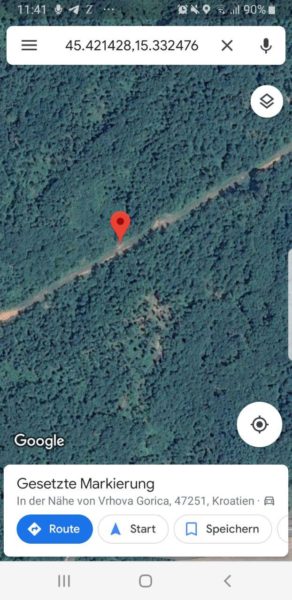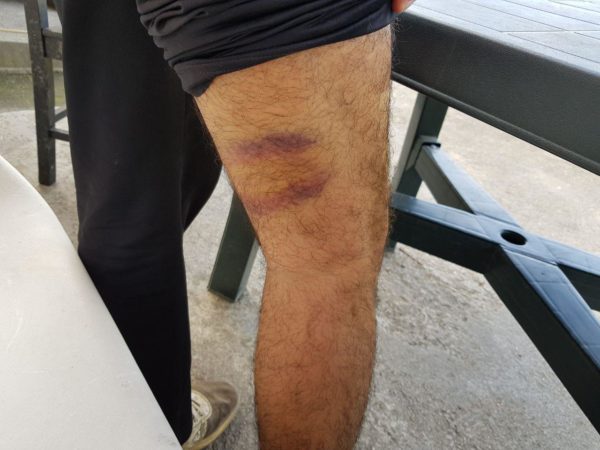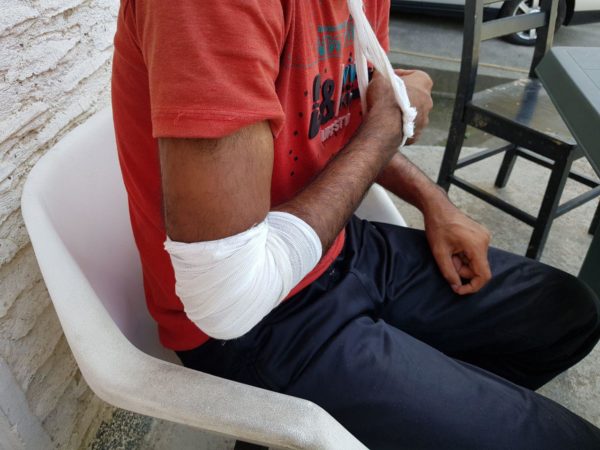On July 31 at 10:00AM, a group of fourteen Pakistani men between 25 and 32 years old crossed the Bosnian-Croatian border near Bihać (BiH), where they had been staying in tents in the forest for the previous couple of days.
They walked through forests and mountains for seven days, experiencing high temperatures during daytime and cool weather at night. They ate one piece of bread everyday and drank rain water, as they ran out of drinking water soon after their departure. Due to the fluctuations in weather conditions, one man caught a cold and had to continue the journey while having fever.
“For seven days, everything was okay, but then the problem started!”
On August 7 at 2:00PM, in the a forest near the route E65 (approximate coordinates see Fig. 1) the group crossed a dirt road when a white van without any insignia passed by.
 Fig. 1.: Estimated place of apprehension
Fig. 1.: Estimated place of apprehension
When they saw the van, they tried to hide next to the road, but the van stopped and immediately returned towards them, so they started running into the forest as fast as they could. However, two men in plain clothes got out of the van and started to shoot at them, aiming at their legs, which made the men immediately give up and return to the dirt road with their hands up.
Getting closer to the two men, the respondent saw them properly and described them as two very tall and muscular men in their thirties
“with the body of police officers, but wearing no police uniforms or boots, just jeans, t-shirts and slippers.”
The men told the respondent and his friends to sit down and take off their shoes in order to make it impossible for them to escape. They spoke English well and explained to the respondent that they were special police and that they would call for more police officers to come.
“They were asking: ‘Why are you going there?’ and I said ‘I am from Kashmir, the situation is not good there. We are walking for seven days, we are close to Slovenia, please, let us go!’, but they only replied ‘It’s our duty, we can not let you.'”
The respondent spent a while talking to the officer about the situation in his home country Kashmir, which they were aware of and interested in. Despite the fact that the two self-proclaimed special police officers were shooting at the men at the beginning, the respondent had an overall positive impression of them, describing them as “very nice and respectful”, unlike the other officers that took them over later on.
After two hours waiting in the forest, a windowless police van arrived and four police officers got out. The respondent described them as ‘local police’ wearing light blue button down shirts, dark blue trousers and black boots.
“They looked at us very angrily and showed us their batons, letting us understand that they will use them on us later.”
The newly arrived officers didn’t talk to the group at all, only with the men who apprehended them. The respondent assumed that they already knew each other. They searched all their bags, their bodies, and took their phones, money and power banks. In total the police took 70-100€ from everyone, six phones and four power banks. The whole procedure took around 40-50 minutes and all fourteen men were put into the windowless police van.
They drove around around two or three hours on bumpy roads, being thrown back and forth in the van. Additionally, the car didn’t have air conditioning and it reached an unbearably hot degree.
Arriving at a small police station that the respondent was not able to identify as he no longer had his phone and was disoriented from the car ride, the four officers, who the respondent described as local police, opened the door for a couple of minutes. One of the officers came to the back and asked for the passwords for a couple of the phones. The respondent assumed this was to get information about the transit group’s route. This officer also put his head in the car and asked the group casually where they were from.
Before leaving, they put nine more men in the van from Iraq and other Arabic speaking countries whose nationality the respondent did not know. He estimated most of the men to be in the same age as the respondent’s transit group (25-32), with only one of them significantly older (around 50 years old). They left the police station around 5:00PM with a total of 23 apprehended individuals in the back of the van. They drove for what seemed to be three or four hours, according to the respondent. The car ride was very uncomfortable with the additional people in the vehicle because there was not a seat from everyone.
“They give a punishment in the van, they know that all people are not in good condition.”
During the drive, the respondent was talking to a man from Iraq who was heavily injured. Due to the mindset of the respondent after hours of driving, he was not able to identify the place nor the exact time of the pushback, but he estimated it to be at around ten in the evening at a place near the border crossing point Maljevac (HRV, see map, coordinates are estimated).
Two of the police officers who picked the group up from Croatia were standing to the left and right of the van’s door. A couple of meters away from the first two officers, there were two new police officers dressed in black uniforms and were standing in the same line as the first two police. They took the men out of the car two by two.
The officers in blue beat them with batons from both sides and pushed them towards their other colleagues in black, who continued to beat them with sticks and kicked them down a hill towards the Croatian border with Bosnia and Herzegovina. The respondent and some of his friends stumbled and fell down from the kicks of the second officers. From the beating with batons, the respondent received a visible bruise on his leg and an injured elbow (see Fig. 2 and 3).
 Fig. 2: Bruise from beatings with batons
Fig. 2: Bruise from beatings with batons
 Fig. 3: Injured elbow from beatings with batons
Fig. 3: Injured elbow from beatings with batons
After this treatment, the group of Pakistanis and some of the Arabic speaking men gathered downhill on the Bosnian side of the border because they were exhausted and disoriented. When the two Croatian police officers in black saw them, they followed them in order to beat and push them further towards Bosnia while crossing the border themselves. The officers chased them through a field and then returned to their other colleagues.
They where shouting while they were beating the group and also the men were screaming in pain as they were beaten. The respondent assumed that because of this noise, some of the local Bosnians living in the neighboring houses next to the border called the Bosnian police.
On the other side of the crops field, the fourteen Pakistani and four of the Iraqi men sat down to rest a little bit and to decide what to do and where to go now. The respondent didn’t know where the five other Arabic speaking men had gone. The group spent around 5 minutes sitting there when a bunch of police officers with torches approached them. At first they tried to run away as they thought it was a new unit of Croatian police following them, “but the officers said: As-salam alaykum, we are from Bosnian police.”
“They asked: ‘Where is Croatian police? They deported you?’ And I said: ‘Yes, they deported us and beat us very badly. They are at the road over there’,
Two Bosnian police officers with torches ran through the field and up the hill to the road with a third officer following behind. They spent a while speaking loudly and angrily to each other on the road while the transit group sat together with some of the other Bosnian police officers. After this interaction with Croatian police, the officers came back, called another van and the group was driven 8-10 minutes to the police station where they were given food and a place to sleep. In the morning, they were brought to the hospital to receive treatment for the injuries they received from Croatian police.
